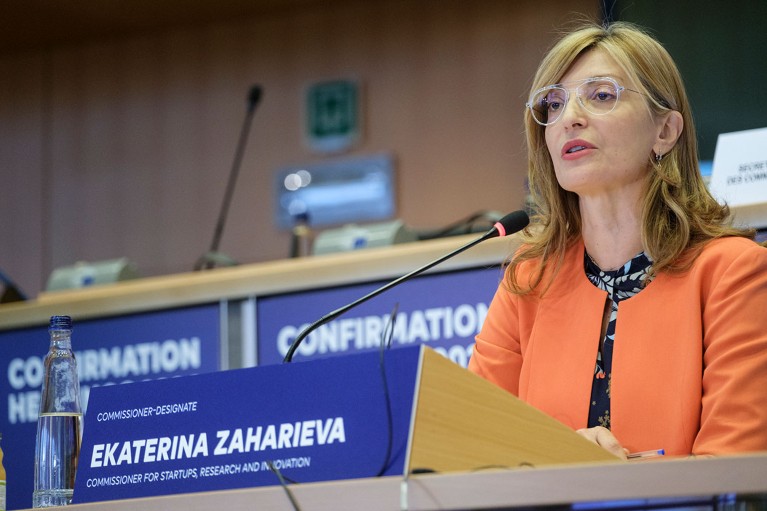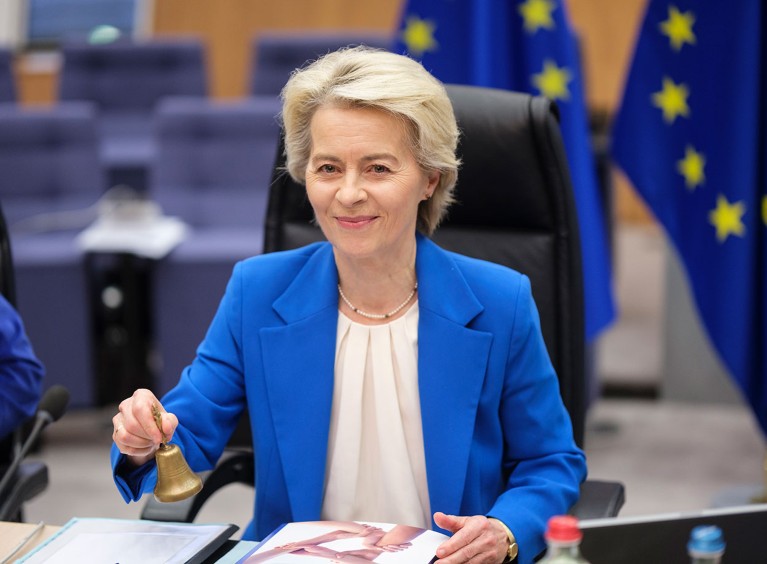
EU research commissioner Ekaterina Zakharieva held positions in the Bulgarian government.Credit: Thierry Monasse/Getty
The European Union has a new research head, tasked with reshaping the world’s biggest collaborative research programme to help stop the bloc’s economic and technological downward slide.
Ekaterina Zaharieva, a lawyer who has held multiple positions in the Bulgarian government — albeit none related to science — became commissioner for start-ups, research and innovation on 1 December.
For scientists, the focus will be on how Zaharieva helps to shape the EU’s next multibillion-euro science programme, the follow-up to the €95.5-billion (US$101-billion) Horizon Europe scheme. The programme includes the bloc’s premier basic-science funder, the European Research Council (ERC). But there is increasing focus on strengthening industry involvement in the scheme to boost innovation.
“We definitely attract the best players from academia now with the ERC,” says Sylvia Schwaag Serger, a research and innovation specialist at Lund University in Sweden. But other parts of the programme haven’t attracted the “best players” from industry, she says.
There needs to be “much more private investment in research”, says Conny Aerts, an astrophysicist at the Catholic University of Leuven (KU Leuven) in Belgium. “This is very low in a European context compared to other continents.” Aerts and Schwaag Serger are members of an expert group appointed by the European Commission that in October made recommendations for the successor scheme, known as Framework Programme 10 (FP10).
Technological anxieties
Zaharieva’s appointment is part of a five-yearly shake-up of the commission, the EU’s powerful executive body. The new term comes as the EU faces growing tensions with Russia and an uncertain relationship with the United States. The bloc is also desperate to improve its economic performance and wean itself off its dependence on US and Chinese technologies.
Commission president Ursula von der Leyen has said that she will prioritize science during her second five-year term to achieve that goal. “We will put research and innovation, science and technology at the heart of our economy,” she said in a speech last week. How she will do that and how much money she will have to do so is still unclear. The commission is expected to release an official proposal on FP10 next year.
As part of this push to turn research into economic growth, there are already some notable changes. For the first time, the commissioner’s title includes ‘start-ups’, reflecting the increased focus on businesses. The commission is also mulling more funding for ‘dual-use science’, which could be used for military purposes.
Basic-science boost?
The good news for researchers is that there’s universal support for the European Research Council, which gives out prestigious grants of €1.5 million to €2.5 million over five years.
“The ERC has become essential to the competitiveness of European science,” concluded a key report written for the commission by Mario Draghi, a former prime minister of Italy, whose recommendations will underpin von der Leyen’s term. Draghi wants the ERC’s roughly €2-billion annual budget to double.

European Commission President Ursula von der Leyen has promised to “expand” the European Research Council, the prestigious grant-funder.Credit: Thierry Monasse/Getty
A boost is essential, because the ERC is under severe strain, says its president Maria Leptin. “Our grants have not increased in size since 2007,” she says. “They’ve lost in value.” An ERC spokesperson estimated that inflation has eroded their real worth by around 40%.
But the ERC cannot increase the size of its grants, because this would mean it couldn’t award as many. And that would mean reductions to an already-low success rate of 14%, which has begun to put off top scientists, Leptin says.
Von der Leyen has promised to “expand” the ERC during her term. But by how much will depend on the outcome of budget negotiations next year with the EU’s member countries, whose own finances are under strain, owing in part to defence spending.
Industry focus
The future of other parts of the EU’s research programme are less clear. Some €53 billion of Horizon Europe’s budget goes largely to directed, applied-research calls in areas such as climate science, space, health and security. These try to build continent-spanning consortia between academics and companies.
But these streams aren’t attracting industry leaders. “It is very bureaucratic,”says Schwaag Serger. “It’s a lot of cost involved for companies to participate in the framework programme, both to prepare them to apply, but also to administer,” she says.
